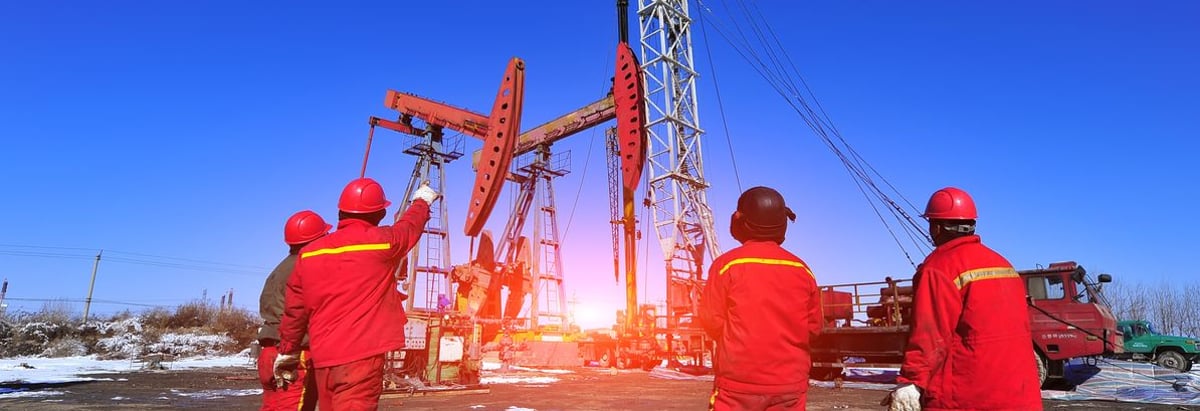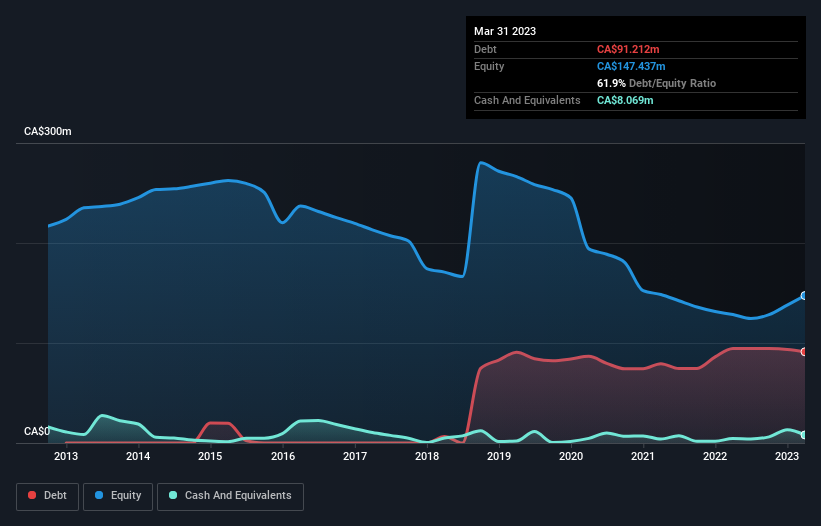
David Iben put it well when he said, 'Volatility is not a risk we care about. What we care about is avoiding the permanent loss of capital.' It's only natural to consider a company's balance sheet when you examine how risky it is, since debt is often involved when a business collapses. Importantly, AKITA Drilling Ltd. (TSE:AKT.A) does carry debt. But the more important question is: how much risk is that debt creating?
When Is Debt A Problem?
Debt is a tool to help businesses grow, but if a business is incapable of paying off its lenders, then it exists at their mercy. Part and parcel of capitalism is the process of 'creative destruction' where failed businesses are mercilessly liquidated by their bankers. However, a more frequent (but still costly) occurrence is where a company must issue shares at bargain-basement prices, permanently diluting shareholders, just to shore up its balance sheet. Of course, the upside of debt is that it often represents cheap capital, especially when it replaces dilution in a company with the ability to reinvest at high rates of return. When we examine debt levels, we first consider both cash and debt levels, together.
View our latest analysis for AKITA Drilling
How Much Debt Does AKITA Drilling Carry?
The chart below, which you can click on for greater detail, shows that AKITA Drilling had CA$91.2m in debt in March 2023; about the same as the year before. On the flip side, it has CA$8.07m in cash leading to net debt of about CA$83.1m.

How Healthy Is AKITA Drilling's Balance Sheet?
According to the last reported balance sheet, AKITA Drilling had liabilities of CA$26.7m due within 12 months, and liabilities of CA$96.1m due beyond 12 months. Offsetting these obligations, it had cash of CA$8.07m as well as receivables valued at CA$54.2m due within 12 months. So its liabilities outweigh the sum of its cash and (near-term) receivables by CA$60.5m.
Given this deficit is actually higher than the company's market capitalization of CA$58.7m, we think shareholders really should watch AKITA Drilling's debt levels, like a parent watching their child ride a bike for the first time. In the scenario where the company had to clean up its balance sheet quickly, it seems likely shareholders would suffer extensive dilution.
We use two main ratios to inform us about debt levels relative to earnings. The first is net debt divided by earnings before interest, tax, depreciation, and amortization (EBITDA), while the second is how many times its earnings before interest and tax (EBIT) covers its interest expense (or its interest cover, for short). This way, we consider both the absolute quantum of the debt, as well as the interest rates paid on it.
While AKITA Drilling has a quite reasonable net debt to EBITDA multiple of 1.9, its interest cover seems weak, at 1.9. In large part that's it has so much depreciation and amortisation. While companies often boast that these charges are non-cash, most such businesses will therefore require ongoing investment (that is not expensed.) Either way there's no doubt the stock is using meaningful leverage. We also note that AKITA Drilling improved its EBIT from a last year's loss to a positive CA$15m. The balance sheet is clearly the area to focus on when you are analysing debt. But it is future earnings, more than anything, that will determine AKITA Drilling's ability to maintain a healthy balance sheet going forward. So if you want to see what the professionals think, you might find this free report on analyst profit forecasts to be interesting.
Finally, a business needs free cash flow to pay off debt; accounting profits just don't cut it. So it's worth checking how much of the earnings before interest and tax (EBIT) is backed by free cash flow. Looking at the most recent year, AKITA Drilling recorded free cash flow of 22% of its EBIT, which is weaker than we'd expect. That weak cash conversion makes it more difficult to handle indebtedness.
Our View
We'd go so far as to say AKITA Drilling's interest cover was disappointing. But at least its net debt to EBITDA is not so bad. Overall, we think it's fair to say that AKITA Drilling has enough debt that there are some real risks around the balance sheet. If everything goes well that may pay off but the downside of this debt is a greater risk of permanent losses. There's no doubt that we learn most about debt from the balance sheet. However, not all investment risk resides within the balance sheet - far from it. We've identified 2 warning signs with AKITA Drilling (at least 1 which can't be ignored) , and understanding them should be part of your investment process.
When all is said and done, sometimes its easier to focus on companies that don't even need debt. Readers can access a list of growth stocks with zero net debt 100% free, right now.
New: Manage All Your Stock Portfolios in One Place
We've created the ultimate portfolio companion for stock investors, and it's free.
• Connect an unlimited number of Portfolios and see your total in one currency
• Be alerted to new Warning Signs or Risks via email or mobile
• Track the Fair Value of your stocks
Have feedback on this article? Concerned about the content? Get in touch with us directly. Alternatively, email editorial-team (at) simplywallst.com.
This article by Simply Wall St is general in nature. We provide commentary based on historical data and analyst forecasts only using an unbiased methodology and our articles are not intended to be financial advice. It does not constitute a recommendation to buy or sell any stock, and does not take account of your objectives, or your financial situation. We aim to bring you long-term focused analysis driven by fundamental data. Note that our analysis may not factor in the latest price-sensitive company announcements or qualitative material. Simply Wall St has no position in any stocks mentioned.
About TSX:AKT.A
AKITA Drilling
Operates as an oil and gas drilling contractor in Canada and the United States.
Slight with mediocre balance sheet.
Similar Companies
Market Insights
Community Narratives




